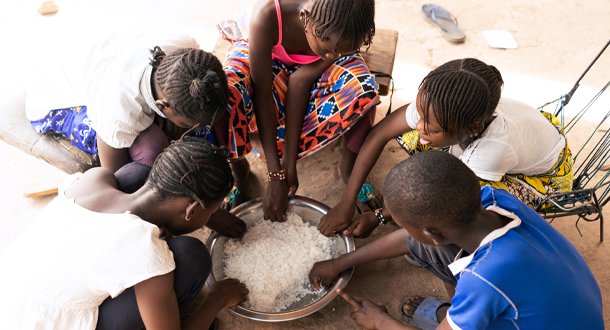
Memorial of the Immaculate Heart of the Blessed Virgin Mary
Scripture:
Lamentations 2:2, 10-14, 18-19
Luke 2:41-51
Reflection:
In vain they ask their mothers,
“Where is the grain?”
As they faint away like the wounded
in the streets of the city,
And breathe their last
in their mothers’ arms.
~Lamentations 2:11-12
The Book of Lamentations was likely compiled between 586 and the end of the 6th century B.C.E.—over 2500 years ago. Yet the situation it describes sounds pretty familiar from our daily news.
The Food and Agriculture Organization of the United Nations released a report this month entitled “Hunger Hotspots. FAO-WFP early warnings on acute food insecurity” (https://www.fao.org/3/cc0364en/cc0364en.pdf). It begins with the tragic fact that “acute food insecurity globally continues to escalate.” Ethiopia, Nigeria, South Sudan, Yemen, Afghanistan, Somalia all have populations projected to experience starvation or death from June to September 2022, the “outlook period” of the report. And these are just the countries that meet the conditions for “catastrophe.” Many others are of high concern: Burkina Faso, Chad, The Democratic Republic of Congo, Haiti, Sudan, the Syrian Arab Republic, Kenya, Sri Lanka, Benin, Cabo Verde, Guinea, Ukraine, Zimbabwe, Angola, Lebanon, Madagascar, Mozambique…all Hunger Hotspots. In Illinois, where I live, 1,211,410 people are facing hunger.
In Jewish liturgical tradition, Lamentations is read once a year on the ninth of Av, a fast day commemorating the heart-rending destruction of both the first Temple in 587 B.C.E. and the second Temple in 70 C.E. The anguish of the poems is palpable, a communal expression of grief and mourning for a way of life that is no more.
How can we not feel anguish today? Ten thousand children die daily from chronic poor nutrition. Soaring food prices driven by the war in Ukraine, persistent drought due to climate change in some countries, at times combined with conflict, and the ongoing economic impact of COVID-19, are driving up food insecurity worldwide. And food insecurity is just one among many interconnected global crises we are facing.
Sometimes it feels as if numbness is safer than giving ourselves over to lament in the face of such excruciating violence and suffering. Yet the Book of Lamentations invites us beyond the temptation to numbness, witnessing to our deep human need for collective lament in the face of incomprehensible realities.
And today, the Feast of the Immaculate Heart of the Blessed Virgin Mary offers us comfort and courage in our grief and lament.
In March, Pope Francis asked us to join him in consecrating all humanity to the Immaculate Heart of the Blessed Virgin Mary. “Turn to Mary,” he invited, “and knock at the door of her heart,” saying “We are your beloved children. In every age you make yourself known to us, calling us to conversion. At this dark hour, help us and grant us your comfort. Say to us once more: ‘Am I not here, I who am your Mother?’”[1] Mary is the mother who is always with us and loves us unconditionally.
Lord, knowing we are held in the tender love of Mary’s heart, help us to truly feel the pain of our world today. Let us together lament and “pour out our hearts like water” (Lam 2:19). Let us not turn away but rather let our hearts, like Mary’s, be pierced, allowing all our children who suffer, all our sisters and brothers who suffer, to enter in.
Help us to trust that, as Pope Francis affirms, this “is a paschal experience, a painful passage that opens to life, a kind of spiritual labour that in the darkness makes us come to the light again.” Grant us the grace to be your body in the world, knowing that the “turning point is not because the problems have disappeared, no, but because crisis has become a mysterious opportunity…”[2]
Amen.
Lissa Romell is the Administrator at St. Vincent Strambi Community in Chicago, Illinois.
[1] Pope Francis, Consecration Prayer, March 25, 2022.
[2] Pope Francis, Homily at Holy Mass for the repose of the Cardinals and Bishops deceased during the course of the year, April 11, 2021.
